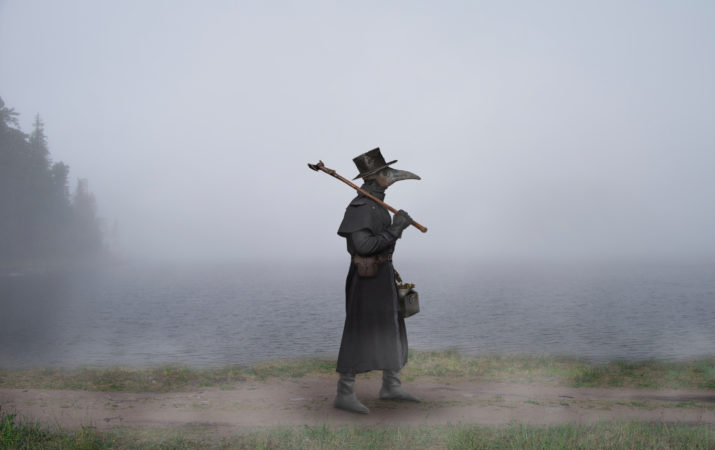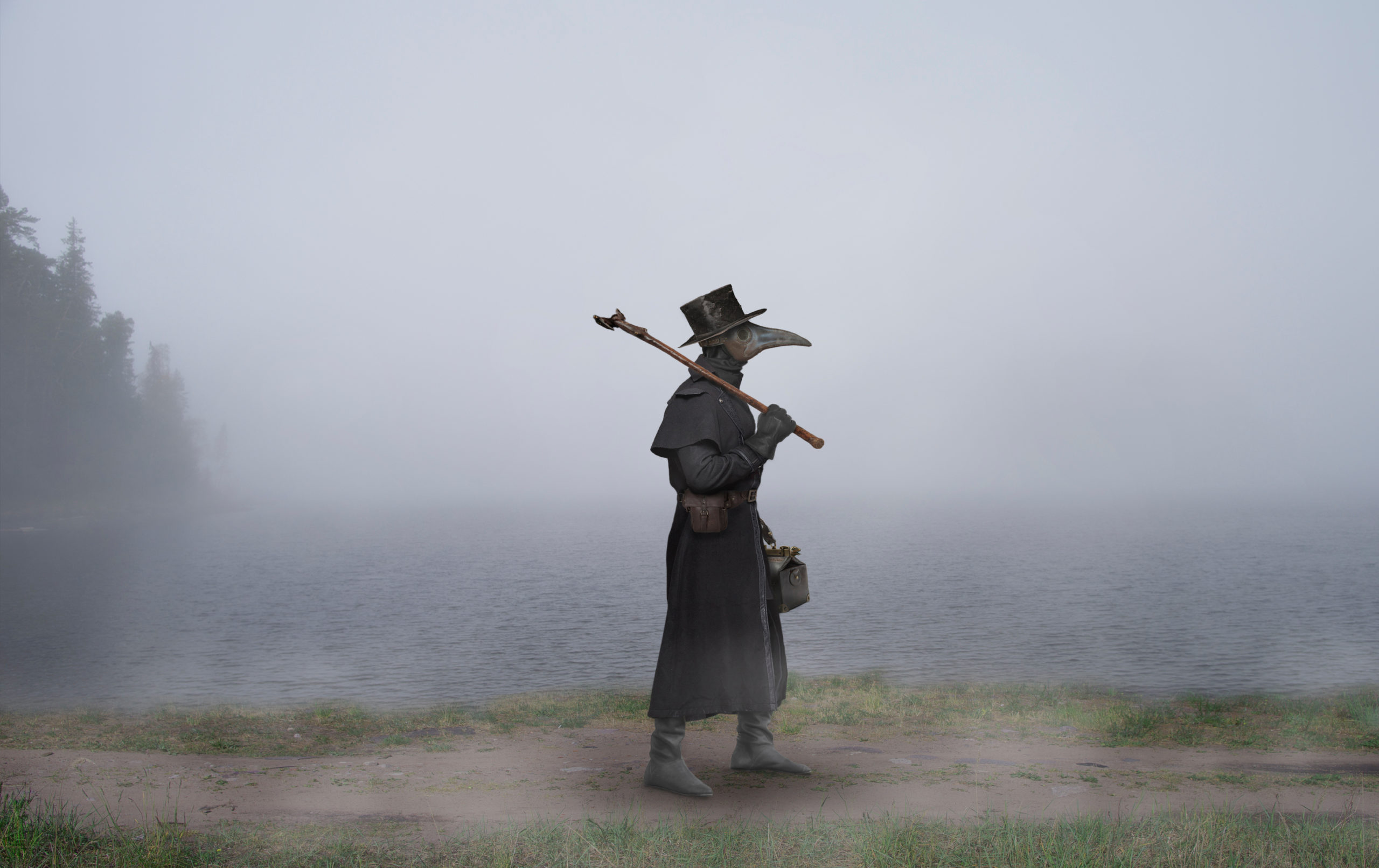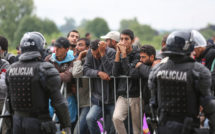
An introduction to a roundtable on Teaching Medieval in Modern Plague Times.
COVID-19 has been the biggest crisis that has faced the modern academy since the last economic collapse—the global recession of 2008. Undeniably, the COVID-19 pandemic has been more of a danger to our health and lives, not to mention our livelihoods, than the 2008 crisis that preceded it. If or when COVID-19 subsides as an existential threat, we will be able to properly take stock of its effects on an already anemic job market, school budgets, tuition revenues, graduation rates, and student attrition and, most tragically, the rate of faculty and student mortalities for the universities that elected to stay open. While many such retrospective evaluations will come in the months and years ahead, we already have sufficient experience to consider how pedagogy at the university level has transformed in the wake of this crisis. For professors teaching courses in the US under the wide umbrella of European Studies, the requirement to teach fully online has raised a distinct set of problems. We, like our fellow academic colleagues in other humanities disciplines, have had to, very quickly, adapt to different technologies, student populations, and administrative needs.
Online education is, of course, not new for many of us employed at regional universities. My institution, the University of Houston-Victoria (located in Victoria, Texas) mainly serves students who work full-time. As such, UHV has a very robust program for online education and much of our tuition revenue come from these “non-traditional” students. Even so, much of our faculty, including myself, teach face-to-face courses, and the sudden transition to online education in March 2020 was deeply disruptive to students accustomed to seeing and learning from their professors in the classroom. I imagined this was the case, multiplied many times over, for professors and students nationwide.
When it comes to teaching European history courses, distance learning becomes even more of a challenge for those of us teaching premodern, and more specifically medieval, European history. Modern European history (which I have taught) also has its challenges for students raised within the American educational system, but students at least have some familiarity with World War II, the Cold War, and other such events that firmly connect our world to the globalizing forces of the twentieth century. If, as a rule, the “past is a foreign country,” for medievalists, the past might just as well be another universe. For those of us who teach ancient or medieval European history, it is, more often than not, a distinct challenge to get the students to understand mentalités and the causes of events very far removed from both their time and experiences. The sudden shift to an online modality made these challenges more daunting in every possible way.
This collection of essays brings together the experiences of a number of junior scholars specializing in medieval history teaching at higher education institutions in the US. The principal goal was to share our experiences but also to record our impressions while still in the middle of the ongoing COVID-19 pandemic, but with sufficient experience to reflect on these experiences. The short essays are illustrative of the different ways in which medievalists have approached the study of premodern European history during the COVID-19 crisis. As these essays attest, many of us have used one of the most catastrophic episodes in medieval Europe, the Black Death, as a teaching tool in our courses. Familiar to most medievalists, both Europeanists and otherwise, the Black Death was the first outbreak of bubonic plague between 1348 and 1353 during the so-called Second Pandemic, which was characterized by continuous outbreaks of plague that lasted in various regions of Europe until circa 1722. Given its span over many centuries and many regions of Europe, this calamity opens up an array of approaches to pedagogy. As many of the contributors note in their essays, the Black Death had an uncanny effect of suddenly making medieval history interesting and relevant to their students, who were no doubt curious about how medieval people dealt with such a destructive force in their own time.
Maria Americo (Saint Peter’s University) had to change her class, for which she had not planned to teach the Black Death, to accommodate her students’ overwhelming interest in the Black Death. Carol Anderson (Montgomery College), in her small community college class, had to adapt to an asynchronous modality—with mixed results—though her students responded well to the readings she assigned, such as Boccaccio’s fourteenth-century account of the plague. Lucy Barnhouse (Arkansas State University) had to deal with moving to different institutions as well as an entirely new student population, entirely unfamiliar with medieval history but that seemed to thrive on a pedagogy built around ungraded assignments. For her study abroad course, Christina Bruno (Fordham University) had to rethink what it meant to walk the Camino de Santiago without actually going to Spain with her students once international travel was no longer possible. Bianca Lopez (Southern Methodist University), for her upper-division seminar on the medieval family, let her students’ interest in the Black Death refocus the class on how pandemics impacted the family in premodern history. Eugene Smelyansky (Washington State University) has a background in medieval studies, which allowed him to highlight how European history can throw contemporary issues into sharp relief.
It is my hope that these essays stimulate not only new ways of thinking about pedagogy during a pandemic but also historical methods and themes in European Studies that might have been overlooked. To learn about Europe now is to appreciate its long history stretching back into the premodern era, and how best to present this unfamiliar past to a current generation of students living in a time of great stress.
-
“COVID, Compassion, Connection: Pedagogy in the Long 2020” by Eugene Smelyansky
-
“Medieval Echoes in Modern Experiences of the COVID-19 Pandemic” by Esther Cuenca
-
“‘The Camino Provides:’ Teaching Pilgrimage Online” by Christina Bruno
-
“Plagues in Our Households: Teaching Medieval and Modern Pandemics through Family History” by Bianca Lopez
-
“The Pestilential Premodern? Going Digital with the Medieval” by Lucy Barnhouse
-
“On Not Teaching the Black Death During COVID-19” by Maria Americo
-
“The Effects of Coronavirus at a Community College” by Carol Anderson
-
Syllabus “Disease, Plague, and Pandemics in Antiquity and Medieval World” by Esther Cuenca
-
Assignment “Disease, Plague, and Pandemics in Antiquity and Medieval World: Final Multimedia Project” by Esther Cuenca
-
Assignment “Medieval Europe: Independent Project Guidelines and Options” by Lucy Barnhouse
Esther Liberman Cuenca is Assistant Professor of History at the University of Houston-Victoria, where she is the designated Europeanist for the school’s history program. She has previously published in EuropeNow on “Medievalism, Nationalism, and European Studies: New Approaches in Digital Pedagogy.” She has articles forthcoming in Popular Music and The Local Historian.
Published on December 8, 2020.





